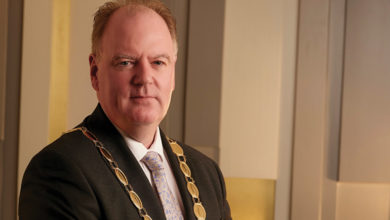Civil legal aid plans spark dispute
 The legal profession strongly opposes the Justice Minister’s plans for further budget cuts.
The legal profession strongly opposes the Justice Minister’s plans for further budget cuts.
After a major reduction in the criminal legal aid budget, the debate has moved on to its civil counterpart. Justice Minister David Ford has insisted that cutting costs will make the system more efficient but lawyers are warning that vulnerable people will lose out as a result.
The reform plans follow on from the review of access to justice, published in September 2011. Announcing his response to the review last July, Justice Minister David Ford said that the high cost of legal aid was “one of the most common complaints” that he received from members of the public and MLAs. The real challenge, in his view, was to improve access to justice and deliver real value for money at the same time.
Reform of criminal legal aid reform was taken forward in 2011, against widespread opposition from the legal profession. Criminal legal aid cost
£59.9 million in 2009-2010 but this fell to £45 million in the last financial year.
Civil legal aid, meanwhile, increased from £36.9 million to £48.7 million. £23 million of last year’s budget was spent on cases brought under the Children (Northern Ireland) Order 1995.
Many of the current arrangements for civil legal aid were set down in 1965. The access to justice review found that a disproportionate number of lawyers were assigned to civil cases, whether or not their expertise was relevant.
The Department of Justice’s consultation started on 29 November and closes on 8 March.
No changes to eligibility for legal aid are being proposed. However, a solicitor would need to expressly seek authorisation if he or she wanted to instruct counsel. Applications are considered by the Northern Ireland Legal Services Commission’s adjudicators. Permission would only be granted if the issues involved in the case required a barrister’s expertise.
Barristers became regular participants in magistrates’ court family proceedings after 1995 as new points of law were arising. The department has concluded that this argument is no longer relevant, as the legislation has been in force for 16 years. It therefore plans to bar counsel from these courts apart from cases where serious child abuse is alleged.
Junior counsel would still be allowed to represent clients in family care centres (county court hearings for family proceedings) but senior counsel would be barred at this level, unless exceptional circumstances existed.
An experienced solicitor may also be allowed to undertake cases at this level without any assistance from counsel. Remuneration for solicitors at this level would be raised, to reflect the additional work and responsibility.
High court family proceedings would, as a rule, only involve junior counsel. Senior counsel would be authorised only where complex matters of law or fact affect the applicant or the case is “wholly different from the norm”. The new rules for family proceedings in county courts and the high court would also apply to other civil cases at those levels.
Similar proposals in England and Wales will exclude QCs from family cases. The rules will take effect in April. David Ford estimates that his proposals will save £2.8-4.2 million per year.
However, Bar Council Chairman Mark Mulholland QC has said that the department’s “arbitrary” approach could undermine the ability of members of the public to use the justice system. “If you are in danger of losing your liberty, your children, your right to decide your own future, your livelihood, your home or your reputation, recourse to the law should be open to you,” he stated.
The Law Society met the Minister in January and will continue to lobby against further cut. “We took the opportunity to reiterate to the Minister our view that civil legal aid is a welfare benefit which is vitally important to the most vulnerable citizens in society,” its President, Michael Robinson, told agendaNi. Reducing that budget would “adversely impact on the ability of those most vulnerable and need within the community to access a solicitor of their choice.”





